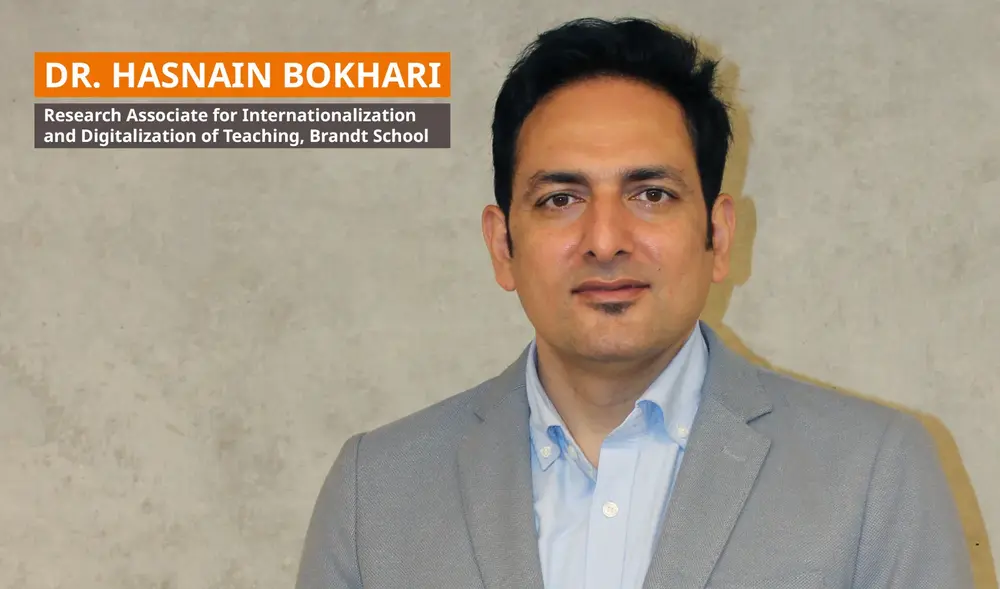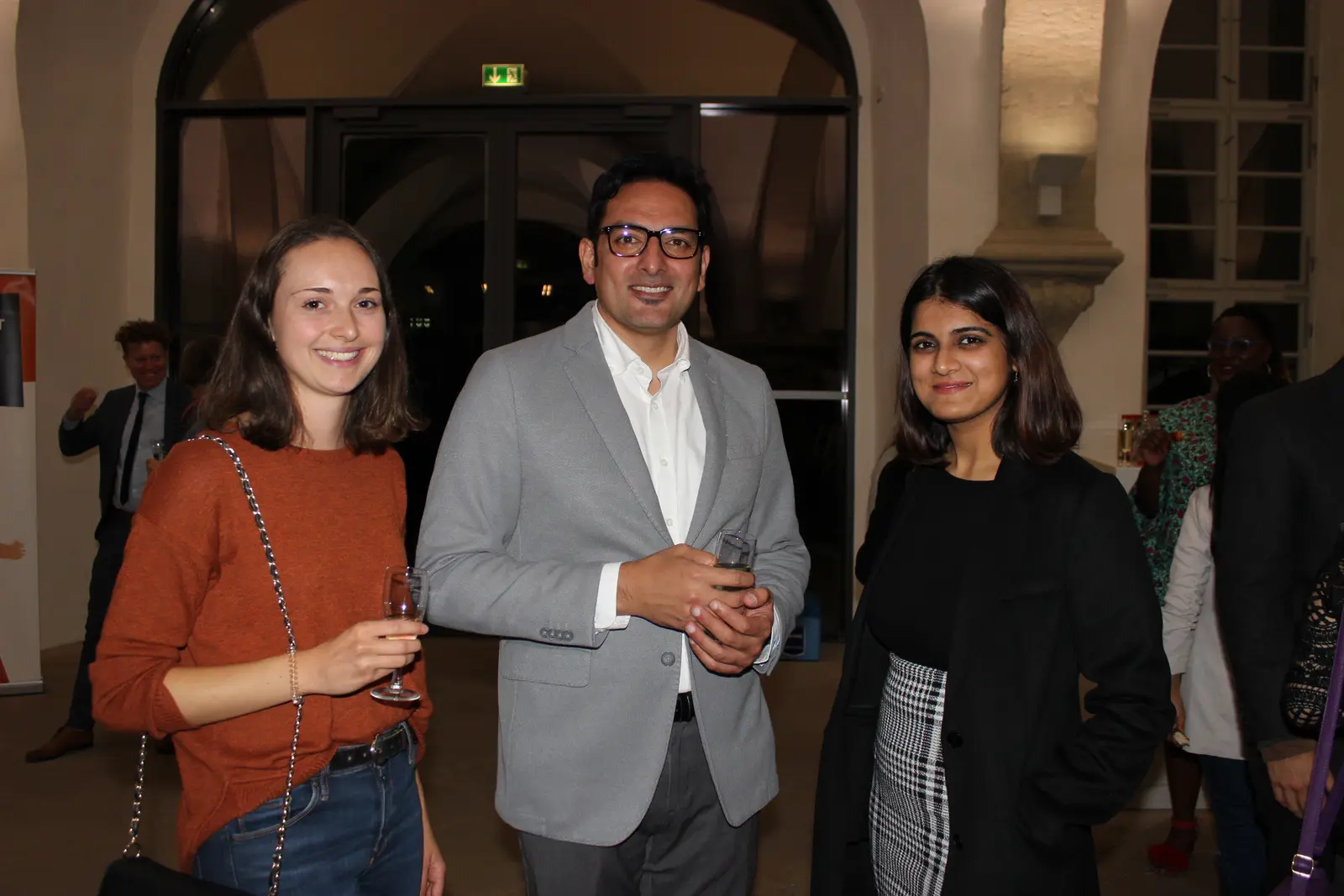The Bulletin interviews: Dr. Hasnain Bokhari on a more internationalised and digitalised Brandt School

All Brandtians would agree that taking Dr Hasnain Bokhari’s class is always an exciting and eye-opening experience. In his 11th year teaching at the Brandt School, he has taken up a new role as our Research Associate for Internationalization and Digitization of Teaching – a perfect topic for the (post-) pandemic era. As December is a good time to retrospect and prospect, and as our application period for the student intake 2023 has just opened yesterday, we have invited Dr Bokhari for an interview to share his remarkable Brandt School story.
Thanks so much for joining us! Congratulation on your 11th year teaching at the Brandt School! From our early alum to research associate, what are some changes you observed through the years? Are there one or two remarkable moments you would like to share?
Thank you very much for your invitation. Brandt School has come a long way in the past twenty years as the first school of Public Policy in Germany. Public Policy is a highly dynamic discipline, and given the geopolitical complexities such as climate change, digitalization and growing inequalities, Public Policy has become a demanding field of study. The question is if we at the Brandt School have responded well to these challenges.
Our teaching staff has taken the lead in establishing its niche. For instance, our director Andreas Goldthau is a leading go-to energy expert often advising the German Bundestag. My colleague, Achim Kemmerling, has recently secured funding from German Science Foundation (DFG) by initiating the state-of-the-art project on the Future of Work. Similarly, Brandt School's founding member Heike Grimm has been instrumental in making Erfurt University a Social Impact Campus with a project on social entrepreneurship funded by the German Federal Ministry of Economics and Technology. If I may mention my digitalization project, it has received funding from the Thuringian State Ministry for Science, Education, and Digital Society.
These are not just one, but several impactful moments that we regularly experience at the Brandt School. Our teaching staff is very proactive in academic mentoring and often assists Brandtians with internships. On the other hand, if we look at our alums, it is exciting to see their work in high-profile positions as advisors in the German Federal Chancellery and State Ministries, as diplomats in their foreign ministries, consultants in INGOs or even in academia within Germany and abroad.

What are the unique qualities you observed in Brandtian? Through the years, what kind of students inspired you most?
Every year Brandt School receives a diverse range of highly motivated students. It is interesting to notice the demography of several cohorts. These cohorts have predominantly represented the millennial generation. However, we are slowly receiving the candidates from Generation Z. I find the interactions between these cohorts and their intermingling extremely interesting and stimulating, whether during capstone exercise or their semester projects.
What I particularly admire about Brandtians is how they hone their skillset according to current employment conditions. I regularly witness them organize peer-learning workshops on data science, Python and quantitative analysis for complex policy problems or even sought-after presentation techniques critical in securing internships or jobs. These aspects also inspire the teaching staff to engage further with our students. For instance, our Brandtians have extremely novel ideas, and to put them to practice, I offer them to work with me as co-authors on various publication projects. In the last two years, Brandtians collaborated with me on topics such as Digital Storytelling, the Digitalisation of social welfare benefits and Open Government in Germany.
Would you share your position as a research associate for the internationalization and digitization of teaching? What are the missions of the research? Why the Brandt School is an ideal environment to conduct the research?
My role as a research associate comes with dual responsibilities . One is establishing international collaborations with academic institutions, particularly public policy schools. I am pleased to share that, from just 2022, we have successfully started an Erasmus partnership with the Department of Public Policy at the Central European University in Austria, two Brandtians are already on their way to attend their semester abroad in 2022/23. Similarly, we have also established a strategic partnership with the International Institute of Public Policy and Management at the University of Malaya in Kuala Lumpur. Currently, we are working on strengthening ties with the Hebrew University of Jerusalem, with whom the Erfurt University already has a standing partnership.
We at the Brandt School and our partners are incredibly excited about these partnerships that would open the door to not only to student exchange, but also faculty exchange, joint research ventures and even collaborative capstone projects, which is the hallmark of the Brandt School.
The second aspect of my research associate role is establishing, testing and deploying joint virtual teaching formats. In the winter semester of 2022/23, I successfully conducted a joint exercise of Collaborative Online International Learning (COIL) with the Department of Gender Studies at the College of Mexico. The feedback from Brandtians has been exciting. While participating in the 'Politics of Social Media Influencers' task, the COIL students also experienced different facets of intercultural learning while communicating with the students from the College of Mexico. Such partnerships, joint collaborative exercises with institutions and Brandt School's linkages to the think tanks, civil society institutions, and ministries are some unique facets that make Brandt School an ideal place to study and research.
''Internationalization requires necessary paraphernalia within university structures, such as multilingual teaching staff, physical infrastructure, research programmes, facilities for international visitors, scholarship opportunities, bilingual websites, attractive exchange programmes, and above all, recognition and appreciation of diversity.''
What particular difficulties are German universities facing in internationalization and digitization of teaching? How do internationalization and digitization work together in your research? As a scholar from the global south, how would you bring your perspective to the research?
I have been associated with the internationalization projects at Erfurt University since 2005, and later worked as a principal investigator on two key projects with funding from the German Academic Exchange Service (DAAD) and German Federal Foreign Office. These experiences provided a unique opportunity to experience international liaisons' intricacies and delicacies closely. In terms of internationalization difficulties, one must consider that until 2008 or so, only a few German universities offered degree programmes in English. Today almost every university tries to attract international students, but internationalization does not function by only attracting international students. Internationalization requires necessary paraphernalia within university structures, such as multilingual teaching staff, physical infrastructure, research programmes, facilities for international visitors, scholarship opportunities, bilingual websites, attractive exchange programmes, and above all, recognition and appreciation of diversity. These aspects are eventually reflected in places, such as the library, the university's official communications and marketing campaigns, or even the dining halls' choice of menu.
I feel Erfurt University responded well to these challenges by initiating its internationalization strategy. Recognizing its contributions, Erfurt University has dedicated an entire floor for the Brandt School in a brand-new building. We also have a very active Vice President for International Affairs and International Office. Our official campus magazine, university's website, official communications, library instructions, and campus maps are available in English and German.
Regarding research on internationalization and digitalization, there are significant lessons one can learn from the countries in Global South. Particularly in the field of eLearning, I am interested in evaluating the technological response, the choice of technologies, the types of eLearning platforms for hybrid classrooms and the learning curve during and after Corona pandemic restrictions.
''There is so much the Brandtians need to learn from each other's social, cultural and intellectual capital. First impressions are never the last for a place like the Brandt School.''
Lastly, what would you like to say to the new Brandtians? Or some tips for this coming winter?
The Brandtians come from highly diverse and intercultural backgrounds. There is so much the Brandtians need to learn from each other's social, cultural and intellectual capital. First impressions are never the last for a place like the Brandt School. I suggest being open to change, being more receptive towards each other and trying to experience the world from the other's perspective. Everyone has their destiny, and the experiences made by others are not necessarily generalizable.
Identify the areas of Public Policy that inspire you the most and look out for workshops, conferences or webinars. Participate in them and build your network. Reach out to the academic mentor in case of any specific educational need or clarification. If there is a project or idea you feel deserves to be implemented, take a look at the Commitment Award at the Brandt School and apply next summer. Make the best use of peer learning, look out for internships for the following summer, as the process can be tedious. Remember to make the best use of your semester ticket to experience the sights and sounds of Thuringia.
Well, thank you so much for spending time with us! Best of luck with this new role, we are looking forward to a more internationalised and digitalised Brandt School!
Dr. Hasnain Bokhari's University Erfurt Profile
About the interviewer
Clara Law is the Bulletin's Editorial Assistant at the Willy Brandt School.
~ The views represented in this blog post do not necessarily represent those of the Brandt School. ~